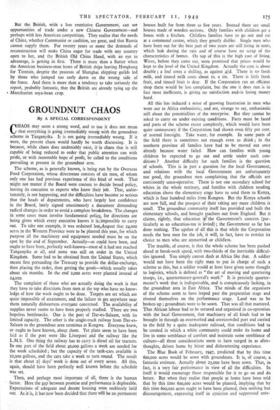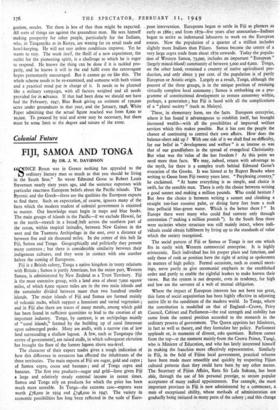GROUNDNUT CHAOS
By A SPECIAL CORRESPONDENT HAOS may seem a strong word, and to use it does not mean that everything is going irremediably wronig with the groundnut scheme in Tanganyika. It is not going irremediably wrong. If it were, the present chaos would hardly be worth discussing. It is because, while chaos does undeniably exist, it' is chaos that is still capable of being reduced to order that public attention can with profit, or with reasonable hope of profit, be called to the conditions prevailing at present in the groundnut area.
The scheme, as is generally known, is being run by the Overseas Food Corporation, whose directorate consists of six men, of whom only one has had previous experience of this kind of work. That might not matter if the Board were content to decide broad policy, leaving its execution to experts who know their job. That, unfor- tunately, is not happening, and the difficulties have become so serious that the heads of departments, who have largely lost confidence in the Board, lately signed unanimously a document demanding radical changes in order to avoid a complete breakdown. The changes in some cases must involve fundamental polica, for directions are being given which every executive knows it iscimpossible to carry out. To take one example, it was ordained lastAugust that 24,000 acres in the Western Province were to be planted this year, for which purpose all the machinery and equipment needed must be on the spot by the end of September. 'Actually—as could have been, and ought to have been, perfectly well-known—most-of it had not reached Tanganyika at all, and some was still on order in the United Kingdom. Some had to be obtained from the T.Inited States, which meant first persuading the Treasury to provide the dollar-exchange, then placing the order, then getting the goods—which usually takes about six months. In the end 2,000 acres were planted instead of 24,000.
The complaint of those who are actually doing the work is that they have to take directions from men at the top who have no know- ledge of how the work ought to be done. Targets are set which are quite impossible of attainment, and the failure to get anywhere near them naturally disheartens everypne concerned. The availability of supplies never seems to have been properly studied. There are two hopeless bottlenecks. One is the port of Dar-es-Salaam, with its limited capacity. The other is the single-track railway from Dar-es- Salaam to the groundnut area terminus at Kongwa. Everyone knew, or ought to have known, about them. Yet plans stem to have been laid as if the port were like Liverpool and the railway like the L.M.S. One thing the railway has to carry is diesel oil for tractors. In one part of the field about 40,000 gallons a Week are needed for the work scheduled ; but the capacity of the tank-cars available is 22,000 gallons, and the cars take a week to turn round. The result is that about 21- days' work is done out of every seven. All this, again, should have been perfectly well known before the schedule was set.
Then, and perhaps most important of all, there is the human factor. Here the gap between promise and performance is deplorable. Expectations of adequate and decent housing were recklessly held our As it is, it has'now been decided that there will be no permanent
houses built for from three to five years. Instead there are small houses made of wooden sections. Only families with children get a house with a kitchen. Childless families have to go out and eat at a communal centre, which they greatly dislike. Single men who have been out for the best part of two years are still living in tents, which leak during the rain and of course have no scrap of the characteristics of homes. On top of this is the high cost of living. Wives, before they came out, were promised that prices would be kept to the level of the United Kingdom. Actually the cost is about double ; a loaf costs a shilling, as against 4fd. There is no fresh milk, and tinned milk costs about is. a tin. There is little fresh fruit, and tinned fruit is dear. If the Corporation ran an efficient shop there would be less complaint, but the one it does run is in fact most inefficient, is giving no satisfaction and. is losing money hard.
All this has induced a sense of growing frustration in men who went out to Africa enthusiastic, and are, strange to say, enthusiastic still about the potentialities of the enterprise. But they cannot be asked to carry on under existing conditions. Facts must be faced and parts of the scheme recast completely, which would have been quite unnecessary if the Corporation had show.n even fifty per cent. of normal foresight. Take water, for example. In some parts of the field there is sometimes not enough even to drink ; in the southern province all families have had to be moved out once already because water failed. How can families with young children be expected to go out and settle under such con- ditions? Another difficulty for such families is the question of schools. This is in part a question for the local Government, and relations with the local Government are unfortunately not good, the groundnut men complaining that the officials are consistently unco-operative. There is not one secondary school for whites in the whole territory, and families with children needing education above the elementary stage have to send them to Kenya, which is four hundred miles from Kongwa. But the Kenya schools are now full, and the prospect of their taking any more children is small. The groundnut community itself has provided and built the elementary schools, and brought Leachers out from England. But it claims, rightly, that education 47 the Government's concern (par- ticularly as an education-tax is levied) ; the Government so far has done nothing. The upshot of all this is that while the Corporation needs the best men for the job, it will, in fact, have to restrict its choice to men who are unmarried or childless.
The trouble, of course, is that the whole scheme has been pushed ahead at break-neck speed, with two-thirds of the inevitable difficul- ties ignored. You simply cannot dash at Africa like that. A soldier would not have been the right man to put in charge of such a scheme as this, but a soldier would at least have given some thought to logistics, which is defined as "the art of moving and quartering troops, i.e., quartermaster-general's work." It is precisely quarter- master's work that is indispensable, and is conspicuously lacking, in the groundnut area in East Africa. The minds of the organisers of the scheme seem to have leaped past the preparation stage and riveted themselves on the performance stage. Land was to be broken up ; groundnuts were to be sown. That was all that mattered. That African labour had to be secured and organised in co-operation with the local Government, that machinery of all kinds had to bo brought in through an overworked and overcrowded port and carried to the field by a quite inadequate railroad, that conditions had to be created in which a white community could make its home and live in some semblance of comfort and maintain some semblance of culture—all these considerations seem to have surged in as after- thoughts, driven home by bitter and disheartening experience.
The Blue Book of February, 1947, predicted that by this time 600,000 acres would be sown with groundnuts. It is, of course, a fantastic estimate. Actually about 25,000 have been sown. That, in fact, is a very fair performance in view of all the difficulties. In itself it would encourage those responsible for it to go on and do better. But when they realise that people at home have been told that by this time 600,000 acres would be planted, implying that by this time 600,000 acres ought to have been planted, then nothing but discouragement, expressing itself in cynicism and suppressed ants- gonism, results. Yet there is less of that than might be expected. All sorts of things are against the groundnut man. He sees himself making prosperity for other people, particularly for the Indians, who, in Tanganyika as in Kenya, are waxing fat on retail trade and hotel-keeping. He will not stay unless conditions improve. Yet he wants to stay. The work itself, the thrill of a new experiment, the outlet for the pioneering spirit, is a challenge to which he is eager to respond. He knows. the thing can be done if it is tackled pro- perly, and he knows it will in the end fulfil even the extravagant hopes prematurely encouraged. But it cannot go on like this. The whole scheme needs to be re-examined, and someone with both vision and a practical mind put in charge of it. It needs to be planned like a military campaign, with all factors weighed and all needs provided for in advance. If that had been done we should not have had the February, 1947, Blue Book giving an estimate of 15o,000 acres under groundnuts in that year, and the January, 1948, White Paper admitting that the actual figure reached was from 8,000 to to,000. To proceed by trial and error may be necessary, but there must be some limit to the degree and nature of the error.







































 Previous page
Previous page